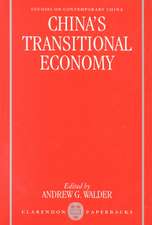The Value of Marx: Political Economy for Contemporary Capitalism: Routledge Frontiers of Political Economy
Autor Alfredo Saad Filhoen Limba Engleză Hardback – 29 noi 2001
The Value of Marx demonstrates that:
*capitalist production necessarily involves conflicts in production and in distribution
*competition is an essential feature of capitalism, but it often generates instability, crises and unemployment, showing that capitalism is not only the most productive but also the most systematically destructive mode of production in history
*capitalist economies are unstable because of the conflicting forces of extraction, realisation and the accumulation of surplus value under competitive conditions. The instability is structural, and even the best economic policies cannot avoid it completely.
The author critically reviews the methodological principles of Marx's value analysis and the best known interpretation of his value theory. He develops an interpretation of Marx focusing primarily upon the processes and relations that regulate social and economic reproduction under capitalism. When analysed from this angle, value theory is a theory of class and exploitation. The concept of value is useful because, among other reasons, it explains capitalist exploitation in spite of the predominance of voluntary market exchanges. The most important controversies in Marxian political economy are reviewed exhaustively, and new light is thrown on the meaning and significance of Marx's analysis and its relevance for contemporary capitalism.
| Toate formatele și edițiile | Preț | Express |
|---|---|---|
| Paperback (1) | 482.53 lei 6-8 săpt. | |
| Taylor & Francis – 17 sep 2007 | 482.53 lei 6-8 săpt. | |
| Hardback (1) | 999.46 lei 6-8 săpt. | |
| Taylor & Francis – 29 noi 2001 | 999.46 lei 6-8 săpt. |
Din seria Routledge Frontiers of Political Economy
-
 Preț: 326.49 lei
Preț: 326.49 lei -
 Preț: 312.86 lei
Preț: 312.86 lei -
 Preț: 310.95 lei
Preț: 310.95 lei -
 Preț: 309.79 lei
Preț: 309.79 lei - 9%
 Preț: 867.54 lei
Preț: 867.54 lei -
 Preț: 151.96 lei
Preț: 151.96 lei -
 Preț: 286.98 lei
Preț: 286.98 lei -
 Preț: 310.55 lei
Preț: 310.55 lei -
 Preț: 327.83 lei
Preț: 327.83 lei - 9%
 Preț: 1005.48 lei
Preț: 1005.48 lei -
 Preț: 325.09 lei
Preț: 325.09 lei - 9%
 Preț: 938.47 lei
Preț: 938.47 lei -
 Preț: 310.01 lei
Preț: 310.01 lei -
 Preț: 309.30 lei
Preț: 309.30 lei -
 Preț: 309.90 lei
Preț: 309.90 lei -
 Preț: 310.36 lei
Preț: 310.36 lei -
 Preț: 386.11 lei
Preț: 386.11 lei -
 Preț: 316.03 lei
Preț: 316.03 lei -
 Preț: 295.14 lei
Preț: 295.14 lei -
 Preț: 155.43 lei
Preț: 155.43 lei -
 Preț: 311.41 lei
Preț: 311.41 lei -
 Preț: 152.66 lei
Preț: 152.66 lei - 9%
 Preț: 1005.31 lei
Preț: 1005.31 lei -
 Preț: 281.72 lei
Preț: 281.72 lei -
 Preț: 278.97 lei
Preț: 278.97 lei -
 Preț: 311.61 lei
Preț: 311.61 lei -
 Preț: 356.63 lei
Preț: 356.63 lei -
 Preț: 371.95 lei
Preț: 371.95 lei -
 Preț: 310.95 lei
Preț: 310.95 lei -
 Preț: 324.87 lei
Preț: 324.87 lei -
 Preț: 326.49 lei
Preț: 326.49 lei -
 Preț: 359.03 lei
Preț: 359.03 lei -
 Preț: 329.09 lei
Preț: 329.09 lei -
 Preț: 341.32 lei
Preț: 341.32 lei - 26%
 Preț: 1047.06 lei
Preț: 1047.06 lei - 18%
 Preț: 1169.45 lei
Preț: 1169.45 lei - 18%
 Preț: 1555.17 lei
Preț: 1555.17 lei - 18%
 Preț: 1053.92 lei
Preț: 1053.92 lei - 18%
 Preț: 1059.84 lei
Preț: 1059.84 lei - 25%
 Preț: 767.47 lei
Preț: 767.47 lei - 18%
 Preț: 731.92 lei
Preț: 731.92 lei - 26%
 Preț: 822.54 lei
Preț: 822.54 lei - 18%
 Preț: 1796.21 lei
Preț: 1796.21 lei - 26%
 Preț: 1184.91 lei
Preț: 1184.91 lei - 18%
 Preț: 1120.23 lei
Preț: 1120.23 lei - 15%
 Preț: 700.95 lei
Preț: 700.95 lei - 18%
 Preț: 1116.31 lei
Preț: 1116.31 lei - 22%
 Preț: 299.52 lei
Preț: 299.52 lei
Preț: 999.46 lei
Preț vechi: 1218.86 lei
-18% Nou
Puncte Express: 1499
Preț estimativ în valută:
191.28€ • 199.17$ • 161.65£
191.28€ • 199.17$ • 161.65£
Carte tipărită la comandă
Livrare economică 08-22 martie
Preluare comenzi: 021 569.72.76
Specificații
ISBN-13: 9780415234344
ISBN-10: 0415234344
Pagini: 192
Dimensiuni: 156 x 234 x 15 mm
Greutate: 0.43 kg
Ediția:1
Editura: Taylor & Francis
Colecția Routledge
Seria Routledge Frontiers of Political Economy
Locul publicării:Oxford, United Kingdom
ISBN-10: 0415234344
Pagini: 192
Dimensiuni: 156 x 234 x 15 mm
Greutate: 0.43 kg
Ediția:1
Editura: Taylor & Francis
Colecția Routledge
Seria Routledge Frontiers of Political Economy
Locul publicării:Oxford, United Kingdom
Public țintă
Postgraduate and ProfessionalCuprins
Introduction 1. Materialist Dialects 1.1 Real Abstractions and Mental Generalisations 1.2 Marx, Hegal and 'New Dialects' 1.3 Conclusion 2. Interpretations of Marx's Value Theory 2.1 Embodied Labour Approaches 2.1.1 Traditional Marxism 2.1.2 Sraffian Analyses 2.2 Values from Theories 2.2.1 The Rubin Tradition 2.2.2 The 'New Interpretation' 2.3 Conclusion 3. Value and Capital 3.1 Division of Labour, Exploitation and Value 3.2 Capital 3.3 Conclusion 4. Wages and Exploitation 4.1 Wage Labour and Exploitation 4.2 Value of Labour Power 4.3 Conclusion 5. Values, Prices and Exploitation 5.1 Normalisation of Labour 5.1.1 Labour Intensity and Complexity, Education and Training 5.1.2 Mechanisation, Deskilling and Capitalist Control 5.2 Synchronisation of Labour 5.2.1 Value Transfers 5.2.2 Technical Change, Value and Crisis 5.3 Homogenisation of Labour 5.4 Conclusion 6. Composition of Capital 6.1 Understanding the Composition of Capital 6.2 Production and the Composition of Capital 6.3 Capital Accumulation 6.4 Conclusion 7. Transformation of Values into Prices of Production 7.1 Surplus Value, Profit, and the Composition of Capital 7.2 From Values to Prices of Production 7.3 The Transformation of Input Values 7.4 Conclusion 8. Money, Credit and Inflation 8.1 Labour and Money 8.2 Money and Prices of Production 8.3 Credit, Money and Inflation 8.4 Conclusion Conclusion References
Descriere
This book constitutes an overview of recent developments in political economy in general, and Marxist value theory in particular. The implications of value theory for bank credit, inflation and deflation are fully explored.























